Eritrea is one of the few African countries that have made great strides in the improvement of health for its citizens. It has made a remarkable achievement in the control of communicable diseases such as malaria, TB, HIV/AIDS (now less than 1%) and immunization of children against various childhood diseases such as measles.
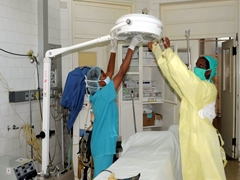
This achievement has won recognition from the World Health Organization (WHO) and attracted support from various cooperating partners such as Japan. One of the projects which Japan has supported in Eritrea is a project for improvement of regional medical services which was implemented in various hospitals in the country. Dr. Berhane Debru, director of medical services, says this has been a major boost to the health sector as it has provided most needed health equipment to the hospitals.
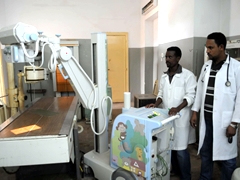
"In 2008, we received medical equipment for referral hospitals in the country. These included anaesthesia, ultra-sound and dental machines as well as operating tables and endoscope sets," he said. They were supplied to Halibet, Villagio Genio, Massawa and Agordat hospitals under a General Grant Aid scheme.
The director says the donation was followed by a technical cooperaton project which has greatly enhanced the capacity and efficiency of these hospitals. The project has a component which assists in the maintenance and management of the equipment and this has been most useful. Preventive maintenance of the equipment has also been enhanced in the hospitals, and this has improved their durability. Equipment which breaks down is repaired at the Bio-medical Engineering Unit (BMEU) in Asmara and this is also supported by JICA.
Dr. Tekleharmanot Tsegai, who is in charge of the 198-bed Halibet hospital, says JICA's support of medical equipment has proven that modern equipment can bring change for the better to the provision of health services in Eritrea. He adds that equipment supplied by JICA was most appreciated as a goodwill gesture between the two countries. "It has transformed our medical theatres and we are now able to carry out more than 20 operations every day. Without this assistance, the situation would have been quite different," he said.
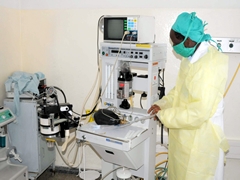
Massawa hospital, which was built in 1958, is old and congested. But Dr. Esmael Omer, a youthful doctor in charge, is hopeful about its future and agrees that the equipment supplied by JICA shall enable it to provide better services to patients. "Although we still need many more equipment due to the size of our hospital, what we have received has enhanced our work and we are grateful. We hope JICA shall donate more equipment to us," he said.
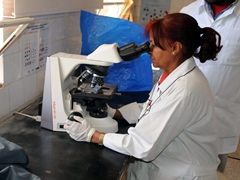
Some of the medical equipment which was supplied by JICA to hospitals in Eritrea.
Some of the equipment that was supplied by JICA to the hospital went out of order at some point but was repaired by technicians at the BMEU in Asmara. However, according to Dr. Omer, some of the machines are very complicated and may need engineers from Japan to restore their functions fully as the locals may not be very conversant with the advanced technology.
Similar sentiments were expressed by Solomon Ogbazghi, the head of BMEU who said although his staff repairs most of the supplied equipment having had some training through JICA, there were some that were quite complicated. "For this reason, there is a need for more advanced training of the staff on how to repair the more advanced machines," he said. "I went for training in Japan but the period was not long enough to master the technology. In fact it is not easy to do so because some equipment, such as the ultrasound machines, are too complicated. Some technicians also came from Japan to teach repairs were of much assistance to us."
Solomo suggests that more collaboration with the suppliers of the equipment would reduce this problem although more advanced training for his staff was still necessary. This was even more so because the medical equipment which JICA has supplied has proven to have contributed a lot to the advancement of health provision in Eritrea.
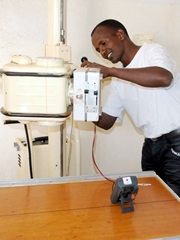
A technician from BMEU which is supported by JICA repairs medical equipment.




scroll